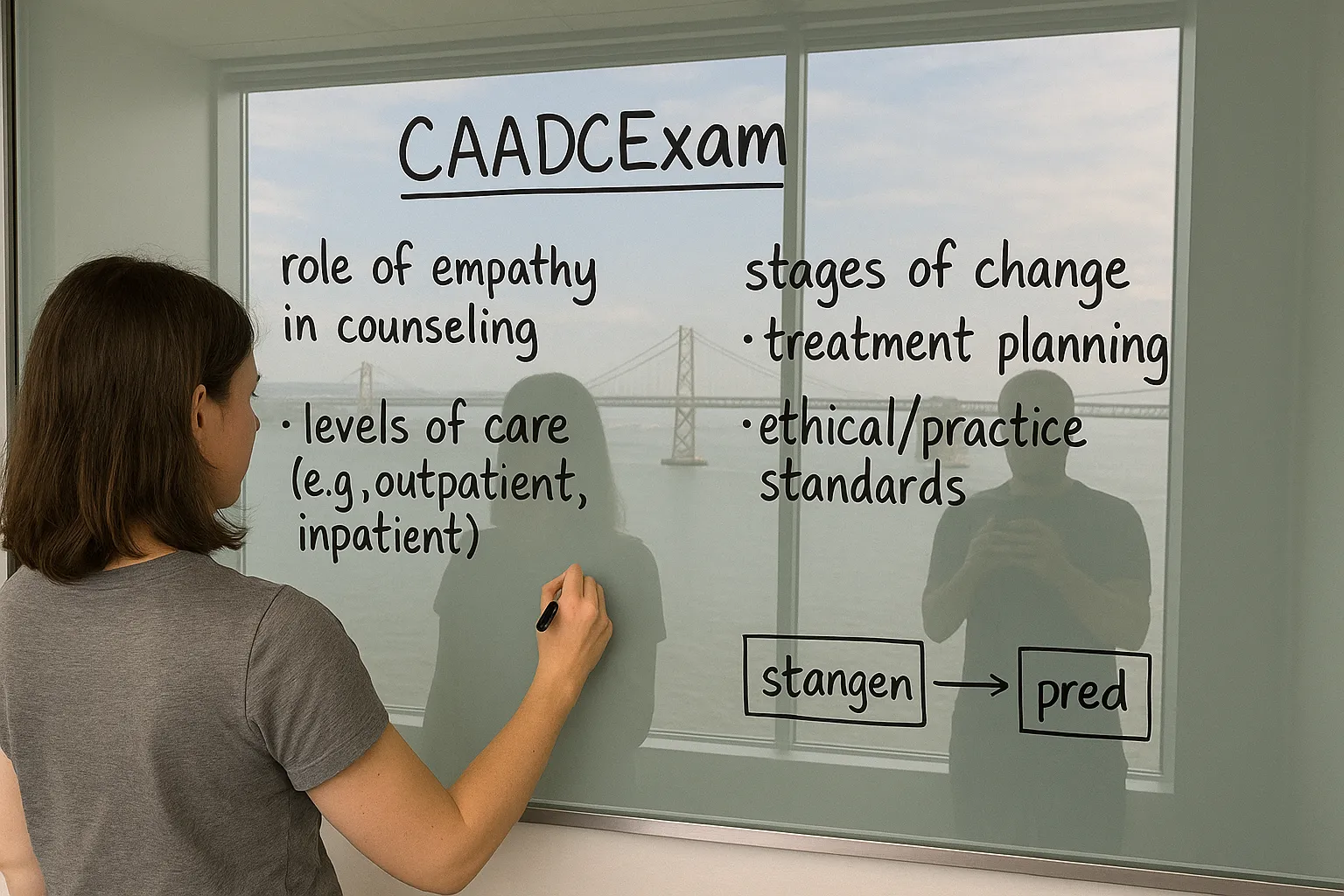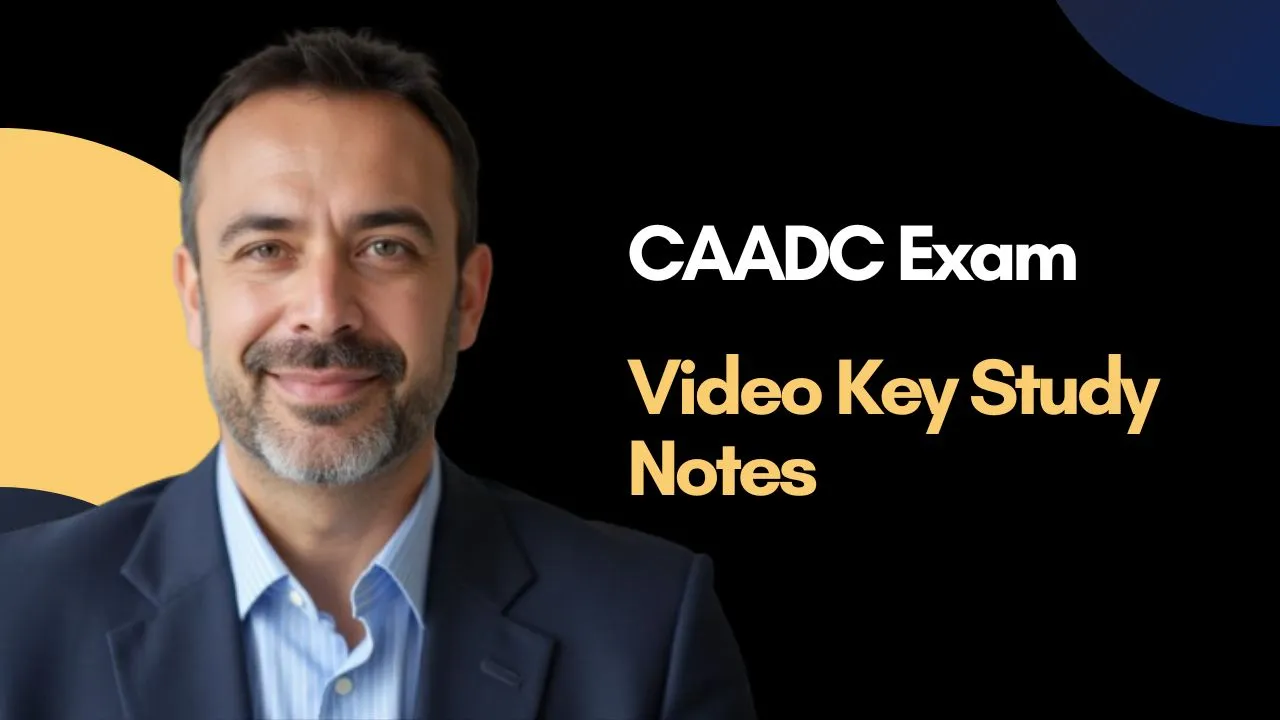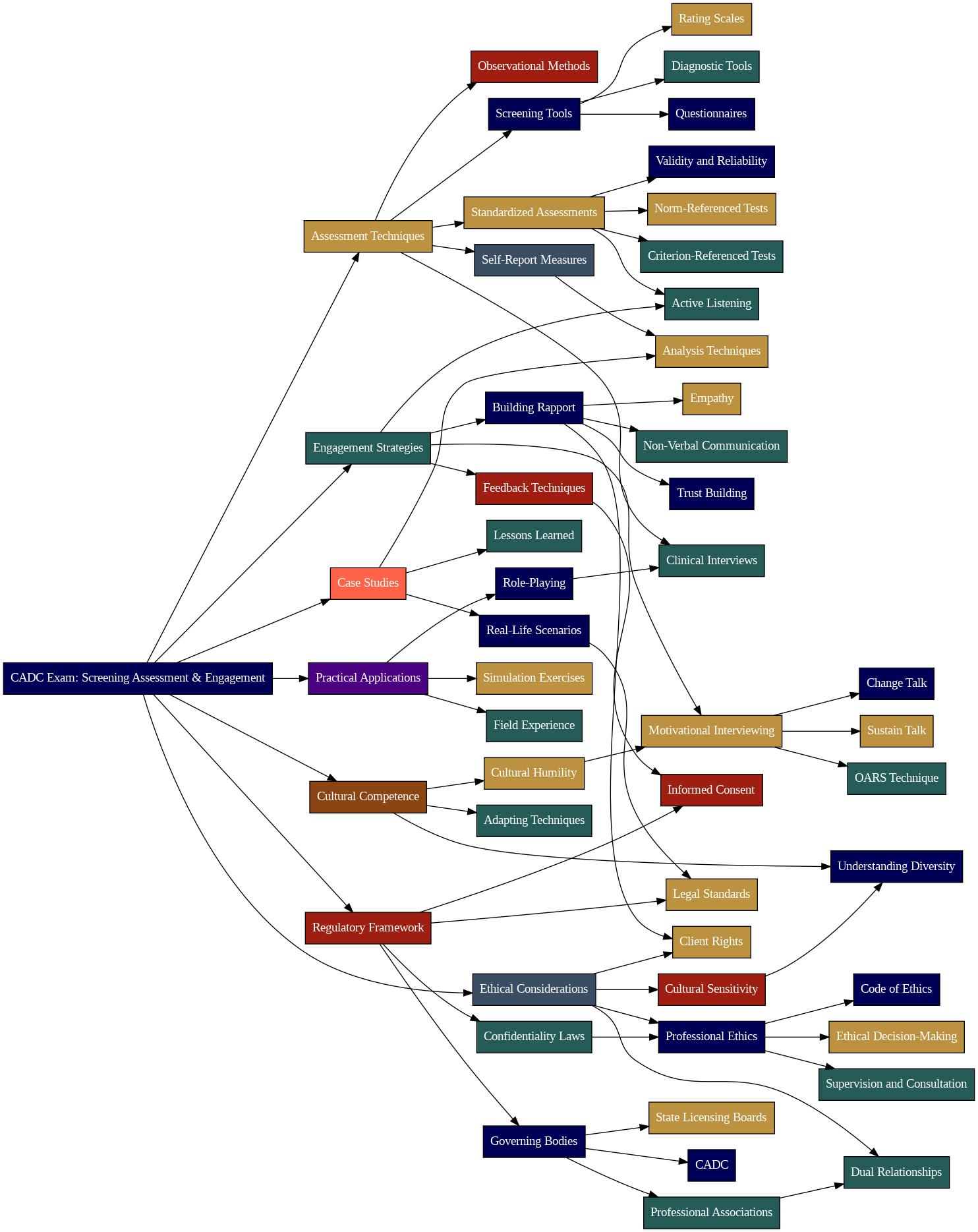Quiz-summary
0 of 29 questions completed
Questions:
- 1
- 2
- 3
- 4
- 5
- 6
- 7
- 8
- 9
- 10
- 11
- 12
- 13
- 14
- 15
- 16
- 17
- 18
- 19
- 20
- 21
- 22
- 23
- 24
- 25
- 26
- 27
- 28
- 29
Information
Premium Practice Questions
You have already completed the quiz before. Hence you can not start it again.
Quiz is loading...
You must sign in or sign up to start the quiz.
You have to finish following quiz, to start this quiz:
Results
0 of 29 questions answered correctly
Your time:
Time has elapsed
Categories
- Not categorized 0%
- 1
- 2
- 3
- 4
- 5
- 6
- 7
- 8
- 9
- 10
- 11
- 12
- 13
- 14
- 15
- 16
- 17
- 18
- 19
- 20
- 21
- 22
- 23
- 24
- 25
- 26
- 27
- 28
- 29
- Answered
- Review
-
Question 1 of 29
1. Question
A newly licensed LCAS in North Carolina, Anya, volunteers at a local community center where she facilitates a weekly support group for individuals recovering from opioid addiction. One of the group members, David, owns a small landscaping business and offers Anya a substantial discount on landscaping services for her home. Anya is struggling financially and could genuinely benefit from the offer. According to the ethical guidelines governing LCAS professionals in North Carolina, what is Anya’s MOST appropriate course of action?
Correct
In North Carolina, Licensed Clinical Addiction Specialists (LCASs) operate under a specific ethical framework that emphasizes client autonomy, beneficence, non-maleficence, justice, fidelity, and veracity. Dual relationships, particularly those that exploit the power imbalance inherent in the therapeutic relationship, are strictly prohibited. The North Carolina Substance Abuse Professional Practice Board (NCSAPPB) provides specific guidelines and definitions related to dual relationships to protect clients from potential harm. The NCSAPPB defines a dual relationship as any situation where the addiction professional has another relationship with the client outside of the professional one, which could impair objectivity, competence, or effectiveness in performing professional functions, or could otherwise risk exploitation or harm to the client. This includes, but is not limited to, business relationships, close personal relationships, or sexual relationships. The ethical imperative is to avoid situations that could compromise the integrity of the therapeutic process and potentially harm the client. Even seemingly innocuous situations, such as bartering services, can blur boundaries and create conflicts of interest. Furthermore, the NCSAPPB guidelines stress the importance of considering the cultural context and potential power dynamics involved in any dual relationship. The overriding principle is that the client’s well-being and therapeutic progress must always be the primary consideration.
Incorrect
In North Carolina, Licensed Clinical Addiction Specialists (LCASs) operate under a specific ethical framework that emphasizes client autonomy, beneficence, non-maleficence, justice, fidelity, and veracity. Dual relationships, particularly those that exploit the power imbalance inherent in the therapeutic relationship, are strictly prohibited. The North Carolina Substance Abuse Professional Practice Board (NCSAPPB) provides specific guidelines and definitions related to dual relationships to protect clients from potential harm. The NCSAPPB defines a dual relationship as any situation where the addiction professional has another relationship with the client outside of the professional one, which could impair objectivity, competence, or effectiveness in performing professional functions, or could otherwise risk exploitation or harm to the client. This includes, but is not limited to, business relationships, close personal relationships, or sexual relationships. The ethical imperative is to avoid situations that could compromise the integrity of the therapeutic process and potentially harm the client. Even seemingly innocuous situations, such as bartering services, can blur boundaries and create conflicts of interest. Furthermore, the NCSAPPB guidelines stress the importance of considering the cultural context and potential power dynamics involved in any dual relationship. The overriding principle is that the client’s well-being and therapeutic progress must always be the primary consideration.
-
Question 2 of 29
2. Question
A North Carolina LCAS, Anya, is working with a client, Ben, who is struggling with opioid addiction. During a session, Ben reveals a detailed plan to harm his former business partner, claiming the partner ruined his life and fueled his addiction. Anya assesses Ben and believes he presents an imminent danger to his former partner. According to North Carolina law and ethical guidelines, what is Anya’s MOST appropriate course of action?
Correct
According to North Carolina statutes and ethical guidelines for Licensed Clinical Addiction Specialists (LCAS), confidentiality is paramount but not absolute. There are specific legal exceptions where an LCAS is mandated to breach confidentiality. These exceptions are typically outlined in North Carolina General Statutes Chapter 122C (Mental Health, Developmental Disabilities, and Substance Abuse Act) and related regulations governing professional conduct for licensed professionals. One critical exception involves situations where a client presents an imminent danger to themselves or others. This duty to protect, sometimes referred to as the “Tarasoff” duty stemming from a landmark legal case, requires the LCAS to take reasonable steps to prevent harm. These steps may include notifying potential victims, contacting law enforcement, or initiating involuntary commitment proceedings if the client meets the criteria for such action under North Carolina law. The determination of imminent danger must be based on a careful assessment of the client’s statements, behaviors, and history. The LCAS must document the assessment process and the actions taken to ensure accountability and adherence to ethical and legal standards. Failing to report a credible threat can result in legal liability and disciplinary action by the North Carolina Substance Abuse Professional Practice Board.
Incorrect
According to North Carolina statutes and ethical guidelines for Licensed Clinical Addiction Specialists (LCAS), confidentiality is paramount but not absolute. There are specific legal exceptions where an LCAS is mandated to breach confidentiality. These exceptions are typically outlined in North Carolina General Statutes Chapter 122C (Mental Health, Developmental Disabilities, and Substance Abuse Act) and related regulations governing professional conduct for licensed professionals. One critical exception involves situations where a client presents an imminent danger to themselves or others. This duty to protect, sometimes referred to as the “Tarasoff” duty stemming from a landmark legal case, requires the LCAS to take reasonable steps to prevent harm. These steps may include notifying potential victims, contacting law enforcement, or initiating involuntary commitment proceedings if the client meets the criteria for such action under North Carolina law. The determination of imminent danger must be based on a careful assessment of the client’s statements, behaviors, and history. The LCAS must document the assessment process and the actions taken to ensure accountability and adherence to ethical and legal standards. Failing to report a credible threat can result in legal liability and disciplinary action by the North Carolina Substance Abuse Professional Practice Board.
-
Question 3 of 29
3. Question
An LCAS in North Carolina suspects that a client, Aisha, may be experiencing domestic violence but Aisha denies it. What is the MOST appropriate way to document this situation in Aisha’s record?
Correct
According to North Carolina’s regulations for LCAS professionals, maintaining accurate and thorough records is essential for ethical and legal reasons. Documentation should include assessment findings, treatment plans, progress notes, and any significant events or incidents that occur during treatment. Progress notes should be specific, objective, and focused on the client’s progress toward their treatment goals. Subjective opinions or personal biases should be avoided. Records must be stored securely to protect client confidentiality. In cases of suspected child abuse or neglect, the LCAS is mandated to report their concerns to the appropriate authorities, and this reporting must be documented in the client’s record.
Incorrect
According to North Carolina’s regulations for LCAS professionals, maintaining accurate and thorough records is essential for ethical and legal reasons. Documentation should include assessment findings, treatment plans, progress notes, and any significant events or incidents that occur during treatment. Progress notes should be specific, objective, and focused on the client’s progress toward their treatment goals. Subjective opinions or personal biases should be avoided. Records must be stored securely to protect client confidentiality. In cases of suspected child abuse or neglect, the LCAS is mandated to report their concerns to the appropriate authorities, and this reporting must be documented in the client’s record.
-
Question 4 of 29
4. Question
Jamal, an LCAS in North Carolina, is working with a client, Tonya, who has a history of opioid use disorder. During a session, Tonya discloses that she has been having intense cravings and has formulated a plan to purchase heroin later that day, stating, “I don’t know if I can stop myself this time.” Tonya has never explicitly threatened harm to herself or others. According to North Carolina statutes and ethical guidelines, what is Jamal’s MOST appropriate course of action?
Correct
According to North Carolina’s statutes and ethical guidelines for Licensed Clinical Addiction Specialists, client confidentiality is paramount, but it is not absolute. There are specific circumstances under which an LCAS is legally and ethically obligated to breach confidentiality. One such circumstance is when a client presents a clear and imminent danger to themselves or others. This duty to protect, often referred to as the “Tarasoff duty” stemming from the landmark court case, supersedes the client’s right to confidentiality. The assessment of “imminent danger” requires careful clinical judgment, considering the client’s history, current presentation, and any specific threats made. Simply having suicidal ideation or a history of violence is not sufficient; there must be a credible and immediate risk. The LCAS must document the rationale for breaching confidentiality, including the specific factors that led to the conclusion of imminent danger. Furthermore, the breach of confidentiality should be limited to what is necessary to prevent the harm, such as notifying potential victims or contacting law enforcement or mental health crisis services. Consulting with a supervisor or legal counsel is advisable in such complex situations to ensure adherence to ethical and legal standards. Ignoring a credible threat would expose the LCAS to legal liability and ethical sanctions, while unnecessary breaches of confidentiality could harm the client and erode trust.
Incorrect
According to North Carolina’s statutes and ethical guidelines for Licensed Clinical Addiction Specialists, client confidentiality is paramount, but it is not absolute. There are specific circumstances under which an LCAS is legally and ethically obligated to breach confidentiality. One such circumstance is when a client presents a clear and imminent danger to themselves or others. This duty to protect, often referred to as the “Tarasoff duty” stemming from the landmark court case, supersedes the client’s right to confidentiality. The assessment of “imminent danger” requires careful clinical judgment, considering the client’s history, current presentation, and any specific threats made. Simply having suicidal ideation or a history of violence is not sufficient; there must be a credible and immediate risk. The LCAS must document the rationale for breaching confidentiality, including the specific factors that led to the conclusion of imminent danger. Furthermore, the breach of confidentiality should be limited to what is necessary to prevent the harm, such as notifying potential victims or contacting law enforcement or mental health crisis services. Consulting with a supervisor or legal counsel is advisable in such complex situations to ensure adherence to ethical and legal standards. Ignoring a credible threat would expose the LCAS to legal liability and ethical sanctions, while unnecessary breaches of confidentiality could harm the client and erode trust.
-
Question 5 of 29
5. Question
Sixteen-year-old Kai, seeking help from an LCAS in Asheville, North Carolina, discloses regular marijuana use and occasional experimentation with prescription opioids obtained from a friend. Kai explicitly asks the LCAS to keep this information confidential from their parents. During a later session, Kai admits to experiencing suicidal thoughts related to academic pressure and social isolation, fueled by their substance use. Considering North Carolina’s ethical guidelines and legal obligations for LCAS professionals, what is the MOST appropriate course of action?
Correct
In North Carolina, Licensed Clinical Addiction Specialists (LCAS) are bound by specific ethical guidelines regarding client confidentiality, particularly when dealing with minors. While the general principle is to maintain confidentiality, exceptions exist, especially concerning the health and safety of the minor. North Carolina law dictates that LCAS professionals are mandated reporters, meaning they are legally obligated to report suspected child abuse or neglect. This obligation supersedes general confidentiality rules. The critical aspect lies in determining whether the minor’s substance use presents a significant risk of harm to themselves or others. If a minor discloses active suicidal ideation, severe health complications due to substance use, or involvement in illegal activities that place them at risk, the LCAS professional must prioritize the minor’s safety and well-being. This involves informing the parents or legal guardians, even without the minor’s consent, and potentially contacting relevant authorities like child protective services. The decision-making process should be carefully documented, outlining the rationale for breaching confidentiality based on the perceived risk and legal obligations. Furthermore, it’s essential to understand that the specific age of consent for substance use treatment in North Carolina does not negate the mandated reporting responsibilities of an LCAS. The ethical dilemma arises from balancing the minor’s right to privacy and autonomy with the duty to protect them from harm, guided by North Carolina laws and ethical standards for addiction specialists.
Incorrect
In North Carolina, Licensed Clinical Addiction Specialists (LCAS) are bound by specific ethical guidelines regarding client confidentiality, particularly when dealing with minors. While the general principle is to maintain confidentiality, exceptions exist, especially concerning the health and safety of the minor. North Carolina law dictates that LCAS professionals are mandated reporters, meaning they are legally obligated to report suspected child abuse or neglect. This obligation supersedes general confidentiality rules. The critical aspect lies in determining whether the minor’s substance use presents a significant risk of harm to themselves or others. If a minor discloses active suicidal ideation, severe health complications due to substance use, or involvement in illegal activities that place them at risk, the LCAS professional must prioritize the minor’s safety and well-being. This involves informing the parents or legal guardians, even without the minor’s consent, and potentially contacting relevant authorities like child protective services. The decision-making process should be carefully documented, outlining the rationale for breaching confidentiality based on the perceived risk and legal obligations. Furthermore, it’s essential to understand that the specific age of consent for substance use treatment in North Carolina does not negate the mandated reporting responsibilities of an LCAS. The ethical dilemma arises from balancing the minor’s right to privacy and autonomy with the duty to protect them from harm, guided by North Carolina laws and ethical standards for addiction specialists.
-
Question 6 of 29
6. Question
A North Carolina LCAS, Fatima, is treating an adult client for opioid use disorder. During a session, the client reveals that their 10-year-old child is frequently left unsupervised for extended periods, often without adequate food, while the client is using substances. Fatima also notices the client seems disoriented and reports difficulty remembering to pick up the child from school. Based on North Carolina law and ethical guidelines for LCAS professionals, what is Fatima’s most appropriate course of action?
Correct
In North Carolina, Licensed Clinical Addiction Specialists (LCASs) are mandated reporters, meaning they have a legal obligation to report suspected child abuse or neglect. This duty is outlined in North Carolina General Statute § 7B-301, which specifies that any person who suspects that a juvenile is abused, neglected, or dependent must report the suspicion to the Department of Social Services (DSS). The law protects reporters from liability if the report is made in good faith. The scenario describes a situation where an LCAS has a reasonable suspicion based on client disclosures, which triggers the reporting obligation. Failing to report could result in legal consequences for the LCAS, including potential fines or disciplinary action by the licensing board. It is crucial to prioritize the safety and well-being of the child by adhering to the mandated reporting requirements. This is not a breach of client confidentiality because mandated reporting supersedes confidentiality in cases of suspected child abuse or neglect. The LCAS must act promptly to protect the juvenile.
Incorrect
In North Carolina, Licensed Clinical Addiction Specialists (LCASs) are mandated reporters, meaning they have a legal obligation to report suspected child abuse or neglect. This duty is outlined in North Carolina General Statute § 7B-301, which specifies that any person who suspects that a juvenile is abused, neglected, or dependent must report the suspicion to the Department of Social Services (DSS). The law protects reporters from liability if the report is made in good faith. The scenario describes a situation where an LCAS has a reasonable suspicion based on client disclosures, which triggers the reporting obligation. Failing to report could result in legal consequences for the LCAS, including potential fines or disciplinary action by the licensing board. It is crucial to prioritize the safety and well-being of the child by adhering to the mandated reporting requirements. This is not a breach of client confidentiality because mandated reporting supersedes confidentiality in cases of suspected child abuse or neglect. The LCAS must act promptly to protect the juvenile.
-
Question 7 of 29
7. Question
During a counseling session, a client in North Carolina expresses a clear and imminent intent to physically harm a specific individual. According to ethical guidelines and legal precedents, what is the LCAS’s MOST appropriate course of action?
Correct
According to the ACA Code of Ethics, counselors have a responsibility to protect client confidentiality, but this right is not absolute. One exception to confidentiality is when a client discloses intent to harm an identifiable third party. In such cases, counselors have a duty to protect (stemming from the Tarasoff decision and similar state laws) and may be required to warn the intended victim or notify law enforcement. This duty to protect overrides the general obligation to maintain client confidentiality. While consulting with colleagues is advisable, it does not negate the counselor’s responsibility to take action to protect the potential victim. Simply encouraging the client to seek hospitalization may not be sufficient to prevent harm, especially if the client refuses or is unable to follow through.
Incorrect
According to the ACA Code of Ethics, counselors have a responsibility to protect client confidentiality, but this right is not absolute. One exception to confidentiality is when a client discloses intent to harm an identifiable third party. In such cases, counselors have a duty to protect (stemming from the Tarasoff decision and similar state laws) and may be required to warn the intended victim or notify law enforcement. This duty to protect overrides the general obligation to maintain client confidentiality. While consulting with colleagues is advisable, it does not negate the counselor’s responsibility to take action to protect the potential victim. Simply encouraging the client to seek hospitalization may not be sufficient to prevent harm, especially if the client refuses or is unable to follow through.
-
Question 8 of 29
8. Question
Sixteen-year-old Maria, residing in North Carolina, seeks substance use counseling from an LCAS, expressing fear of parental notification due to potential repercussions at home, but denies any suicidal ideation or homicidal intent. Maria is deemed by the LCAS to be a “mature minor” capable of understanding the risks and benefits of treatment. Under what specific conditions, according to North Carolina law and ethical guidelines, would the LCAS *mandatorily* breach Maria’s confidentiality *without* her consent?
Correct
North Carolina’s regulations surrounding confidentiality for LCAS professionals are stringent, particularly when dealing with minors seeking substance use treatment. While generally, parental consent is required for a minor’s medical treatment, exceptions exist to encourage minors to seek help for substance use without fear of parental notification, which could deter them from seeking necessary care. The North Carolina statutes, specifically Article 1A of Chapter 122C, address confidentiality in substance abuse treatment. These statutes emphasize protecting the minor’s privacy, but they also outline specific circumstances where disclosure is permissible or mandated. These exceptions include situations where the minor poses an imminent danger to themselves or others, or when mandated by law (e.g., reporting child abuse or neglect). In cases where a minor is deemed capable of making their own decisions regarding treatment (often assessed on a case-by-case basis, considering factors like maturity and understanding of the risks and benefits of treatment), the LCAS professional must carefully weigh the ethical considerations of confidentiality against the potential risks to the minor or others. Consultation with supervisors, legal counsel, and ethical guidelines from professional organizations like NAADAC (National Association for Alcoholism and Drug Abuse Counselors) are crucial in navigating these complex situations. The “mature minor doctrine,” though not explicitly codified for substance abuse treatment in North Carolina, provides a framework for assessing a minor’s capacity to consent to treatment independently. Therefore, an LCAS professional must prioritize the minor’s safety and well-being while adhering to legal and ethical obligations, which may involve disclosing information to relevant parties when necessary to prevent harm.
Incorrect
North Carolina’s regulations surrounding confidentiality for LCAS professionals are stringent, particularly when dealing with minors seeking substance use treatment. While generally, parental consent is required for a minor’s medical treatment, exceptions exist to encourage minors to seek help for substance use without fear of parental notification, which could deter them from seeking necessary care. The North Carolina statutes, specifically Article 1A of Chapter 122C, address confidentiality in substance abuse treatment. These statutes emphasize protecting the minor’s privacy, but they also outline specific circumstances where disclosure is permissible or mandated. These exceptions include situations where the minor poses an imminent danger to themselves or others, or when mandated by law (e.g., reporting child abuse or neglect). In cases where a minor is deemed capable of making their own decisions regarding treatment (often assessed on a case-by-case basis, considering factors like maturity and understanding of the risks and benefits of treatment), the LCAS professional must carefully weigh the ethical considerations of confidentiality against the potential risks to the minor or others. Consultation with supervisors, legal counsel, and ethical guidelines from professional organizations like NAADAC (National Association for Alcoholism and Drug Abuse Counselors) are crucial in navigating these complex situations. The “mature minor doctrine,” though not explicitly codified for substance abuse treatment in North Carolina, provides a framework for assessing a minor’s capacity to consent to treatment independently. Therefore, an LCAS professional must prioritize the minor’s safety and well-being while adhering to legal and ethical obligations, which may involve disclosing information to relevant parties when necessary to prevent harm.
-
Question 9 of 29
9. Question
A Licensed Clinical Addiction Specialist (LCAS) in North Carolina is creating a new electronic health record (EHR) system for their practice. The LCAS wants to ensure full compliance with privacy regulations. Which of the following statements accurately describes the relationship between HIPAA and North Carolina state law regarding patient privacy?
Correct
The Health Insurance Portability and Accountability Act (HIPAA) Privacy Rule establishes national standards to protect individuals’ medical records and other personal health information. The HIPAA Security Rule establishes a national standard of security safeguards to protect individual’s electronic personal health information. While HIPAA sets a federal standard, state laws can provide additional or more stringent protections. In cases where state law is stricter than HIPAA, the state law prevails. North Carolina has specific laws regarding the confidentiality of mental health and substance use treatment records, which may offer greater protection than HIPAA in some instances. Therefore, it is crucial for LCAS professionals in North Carolina to be knowledgeable about both HIPAA and relevant state laws to ensure they are adhering to the highest standard of confidentiality.
Incorrect
The Health Insurance Portability and Accountability Act (HIPAA) Privacy Rule establishes national standards to protect individuals’ medical records and other personal health information. The HIPAA Security Rule establishes a national standard of security safeguards to protect individual’s electronic personal health information. While HIPAA sets a federal standard, state laws can provide additional or more stringent protections. In cases where state law is stricter than HIPAA, the state law prevails. North Carolina has specific laws regarding the confidentiality of mental health and substance use treatment records, which may offer greater protection than HIPAA in some instances. Therefore, it is crucial for LCAS professionals in North Carolina to be knowledgeable about both HIPAA and relevant state laws to ensure they are adhering to the highest standard of confidentiality.
-
Question 10 of 29
10. Question
A North Carolina LCAS, during a counseling session with a client seeking treatment for opioid addiction, learns that the client’s eight-year-old child is frequently left unsupervised at home while the client is out seeking drugs. The client admits to occasionally using drugs in the same room as the child, although denies any direct harm to the child. The client expresses fear of losing custody if DSS becomes involved. Under North Carolina law and ethical guidelines for LCAS professionals, what is the MOST appropriate course of action for the LCAS?
Correct
In North Carolina, Licensed Clinical Addiction Specialists (LCASs) are mandated reporters, meaning they are legally obligated to report suspected child abuse or neglect. This obligation is outlined in North Carolina General Statute § 7B-301, which details the duty to report when there is reasonable cause to suspect that a juvenile is abused, neglected, or dependent. “Reasonable cause to suspect” is a lower threshold than absolute certainty; it implies a good-faith belief based on credible information or observations. The purpose of mandated reporting is to protect vulnerable individuals, especially children, from harm. Failing to report suspected abuse or neglect can result in legal penalties for the LCAS, including fines or even criminal charges. The LCAS must also consider the ethical implications of not reporting, as it violates the professional code of conduct and the duty to protect clients and others from harm. Consultation with supervisors or legal counsel is advisable in complex situations to ensure compliance with both legal and ethical obligations. Furthermore, the LCAS needs to be aware of the specific reporting procedures in North Carolina, which typically involve contacting the Department of Social Services (DSS) in the county where the child resides or where the suspected abuse occurred. Accurate and timely reporting is crucial for the well-being of the child and the integrity of the LCAS’s professional practice.
Incorrect
In North Carolina, Licensed Clinical Addiction Specialists (LCASs) are mandated reporters, meaning they are legally obligated to report suspected child abuse or neglect. This obligation is outlined in North Carolina General Statute § 7B-301, which details the duty to report when there is reasonable cause to suspect that a juvenile is abused, neglected, or dependent. “Reasonable cause to suspect” is a lower threshold than absolute certainty; it implies a good-faith belief based on credible information or observations. The purpose of mandated reporting is to protect vulnerable individuals, especially children, from harm. Failing to report suspected abuse or neglect can result in legal penalties for the LCAS, including fines or even criminal charges. The LCAS must also consider the ethical implications of not reporting, as it violates the professional code of conduct and the duty to protect clients and others from harm. Consultation with supervisors or legal counsel is advisable in complex situations to ensure compliance with both legal and ethical obligations. Furthermore, the LCAS needs to be aware of the specific reporting procedures in North Carolina, which typically involve contacting the Department of Social Services (DSS) in the county where the child resides or where the suspected abuse occurred. Accurate and timely reporting is crucial for the well-being of the child and the integrity of the LCAS’s professional practice.
-
Question 11 of 29
11. Question
Jamal, an LCAS in North Carolina, receives a formal request from a client, Sarah, to access her complete treatment record. Sarah has a history of unstable emotional regulation and past suicide attempts. Within Sarah’s record are detailed notes from a family therapy session that include sensitive information about Sarah’s sister, who is not a client. Which of the following actions BEST demonstrates Jamal’s ethical and legal responsibility in responding to Sarah’s request under North Carolina regulations and relevant federal laws?
Correct
North Carolina’s regulations concerning client records for LCAS professionals emphasize the importance of secure storage, accessibility, and adherence to confidentiality laws, including HIPAA and 42 CFR Part 2. When a client requests their records, an LCAS must comply while ensuring the integrity of the record and protecting the confidentiality of any third-party information contained within. The process involves carefully reviewing the record to identify and redact information that could potentially harm the client or violate the privacy of others. An LCAS professional in North Carolina must adhere to both state and federal regulations regarding client access to records, which includes providing the information in a timely manner and in a format that is accessible to the client. Additionally, the LCAS must document the request, the review process, and any redactions made, along with the justification for those redactions, to maintain accountability and transparency. The primary goal is to balance the client’s right to access their information with the ethical and legal obligations to protect confidentiality and prevent harm. This includes instances where the release of certain information could be detrimental to the client’s well-being or compromise ongoing treatment efforts.
Incorrect
North Carolina’s regulations concerning client records for LCAS professionals emphasize the importance of secure storage, accessibility, and adherence to confidentiality laws, including HIPAA and 42 CFR Part 2. When a client requests their records, an LCAS must comply while ensuring the integrity of the record and protecting the confidentiality of any third-party information contained within. The process involves carefully reviewing the record to identify and redact information that could potentially harm the client or violate the privacy of others. An LCAS professional in North Carolina must adhere to both state and federal regulations regarding client access to records, which includes providing the information in a timely manner and in a format that is accessible to the client. Additionally, the LCAS must document the request, the review process, and any redactions made, along with the justification for those redactions, to maintain accountability and transparency. The primary goal is to balance the client’s right to access their information with the ethical and legal obligations to protect confidentiality and prevent harm. This includes instances where the release of certain information could be detrimental to the client’s well-being or compromise ongoing treatment efforts.
-
Question 12 of 29
12. Question
A North Carolina LCAS, Jamison, is treating a client, Maria, for opioid use disorder. Maria discloses that she occasionally leaves her young child unattended for brief periods while she uses substances. Jamison is aware of North Carolina’s mandated reporting laws. Considering the ethical and legal obligations of an LCAS in North Carolina, what is Jamison’s MOST appropriate course of action?
Correct
North Carolina’s regulations regarding client confidentiality are primarily governed by state laws and ethical guidelines for Licensed Clinical Addiction Specialists (LCAS). While 42 CFR Part 2 applies to federally assisted substance use disorder programs, North Carolina law also addresses confidentiality more broadly. An LCAS must understand both federal and state regulations. The Tar Heel state permits disclosure without client consent in specific situations, such as mandated reporting of child abuse or neglect, imminent danger to self or others, or a valid court order. Dual relationships are strictly prohibited to maintain objectivity and prevent exploitation. Ethical decision-making models guide clinicians in navigating complex situations, prioritizing client welfare and adhering to legal and ethical standards. Professional accountability requires LCASs to maintain competence, practice within their scope, and address ethical violations by colleagues. Cultural competence is essential to provide effective and respectful care to diverse populations, recognizing how cultural beliefs and practices influence substance use and treatment. Failing to adhere to these principles can result in disciplinary actions by the licensing board, legal repercussions, and harm to clients. The LCAS must be knowledgeable about the specific reporting requirements in North Carolina, including those related to duty to warn and mandatory reporting of abuse.
Incorrect
North Carolina’s regulations regarding client confidentiality are primarily governed by state laws and ethical guidelines for Licensed Clinical Addiction Specialists (LCAS). While 42 CFR Part 2 applies to federally assisted substance use disorder programs, North Carolina law also addresses confidentiality more broadly. An LCAS must understand both federal and state regulations. The Tar Heel state permits disclosure without client consent in specific situations, such as mandated reporting of child abuse or neglect, imminent danger to self or others, or a valid court order. Dual relationships are strictly prohibited to maintain objectivity and prevent exploitation. Ethical decision-making models guide clinicians in navigating complex situations, prioritizing client welfare and adhering to legal and ethical standards. Professional accountability requires LCASs to maintain competence, practice within their scope, and address ethical violations by colleagues. Cultural competence is essential to provide effective and respectful care to diverse populations, recognizing how cultural beliefs and practices influence substance use and treatment. Failing to adhere to these principles can result in disciplinary actions by the licensing board, legal repercussions, and harm to clients. The LCAS must be knowledgeable about the specific reporting requirements in North Carolina, including those related to duty to warn and mandatory reporting of abuse.
-
Question 13 of 29
13. Question
A Licensed Clinical Addictions Specialist (LCAS) in North Carolina, working with an adult client struggling with opioid addiction, learns that the client’s eight-year-old child is frequently left unsupervised for extended periods while the client is using. The client admits to occasionally using opioids in the same room as the child, although the client states they never directly involve the child. According to North Carolina law and ethical guidelines for LCAS professionals, what is the MOST appropriate course of action for the LCAS?
Correct
In North Carolina, Licensed Clinical Addiction Specialists (LCAS) are mandated reporters, meaning they are legally obligated to report suspected child abuse or neglect. The North Carolina General Statutes, specifically Article 3 of Chapter 7B, outlines the legal framework for reporting child abuse, neglect, and dependency. The statutes define “abuse” broadly, encompassing physical, emotional, and sexual abuse, as well as neglect, which includes failing to provide adequate care, supervision, or a safe environment. An LCAS’s duty to report arises when they have reasonable cause to suspect that a child is abused, neglected, or dependent. This duty supersedes confidentiality in these specific situations, aligning with the ethical principle of beneficence (acting in the best interest of the child) and non-maleficence (avoiding harm). Failure to report suspected child abuse or neglect can result in legal penalties for the LCAS, including fines or imprisonment, and disciplinary action from the licensing board. The LCAS must make an oral report immediately to the Department of Social Services (DSS) in the county where the child resides or is found. A written report typically follows within 24 hours. The LCAS should document the facts that led to the suspicion, but should not conduct their own investigation.
Incorrect
In North Carolina, Licensed Clinical Addiction Specialists (LCAS) are mandated reporters, meaning they are legally obligated to report suspected child abuse or neglect. The North Carolina General Statutes, specifically Article 3 of Chapter 7B, outlines the legal framework for reporting child abuse, neglect, and dependency. The statutes define “abuse” broadly, encompassing physical, emotional, and sexual abuse, as well as neglect, which includes failing to provide adequate care, supervision, or a safe environment. An LCAS’s duty to report arises when they have reasonable cause to suspect that a child is abused, neglected, or dependent. This duty supersedes confidentiality in these specific situations, aligning with the ethical principle of beneficence (acting in the best interest of the child) and non-maleficence (avoiding harm). Failure to report suspected child abuse or neglect can result in legal penalties for the LCAS, including fines or imprisonment, and disciplinary action from the licensing board. The LCAS must make an oral report immediately to the Department of Social Services (DSS) in the county where the child resides or is found. A written report typically follows within 24 hours. The LCAS should document the facts that led to the suspicion, but should not conduct their own investigation.
-
Question 14 of 29
14. Question
A Licensed Clinical Addiction Specialist (LCAS) in North Carolina, Jamison, is treating a client, Lakisha, for opioid use disorder. During a session, Lakisha reveals that her partner, with whom she co-parents a 3-year-old child, has been leaving the child unattended for extended periods while using heroin. Lakisha states she is afraid to intervene directly but is worried about the child’s safety. Considering North Carolina laws and ethical guidelines for LCAS professionals, what is Jamison’s MOST appropriate course of action?
Correct
According to the North Carolina Administrative Code, specifically 21 NCAC 36 .0236, Licensed Clinical Addiction Specialists (LCAS) are mandated reporters of suspected child abuse or neglect. This obligation stems from the recognition that substance use disorders can impair a parent or caregiver’s ability to provide adequate care and protection for a child. The legal threshold for reporting is reasonable suspicion, meaning that the LCAS must have a good faith belief, based on articulable facts, that abuse, neglect, or dependency has occurred. This duty to report supersedes confidentiality concerns, aligning with the state’s interest in protecting vulnerable children. The information reported should include the child’s name, address, age, the nature of the suspected abuse or neglect, and any information that would assist in locating the child and family. Failure to report suspected child abuse or neglect can result in legal consequences for the LCAS, including potential disciplinary action by the licensing board. The standard of “reasonable suspicion” balances the need to protect children with the rights of parents or caregivers, ensuring that reports are made based on credible concerns rather than unsubstantiated allegations. The LCAS must document the reasons for their suspicion and the steps taken to report the concern.
Incorrect
According to the North Carolina Administrative Code, specifically 21 NCAC 36 .0236, Licensed Clinical Addiction Specialists (LCAS) are mandated reporters of suspected child abuse or neglect. This obligation stems from the recognition that substance use disorders can impair a parent or caregiver’s ability to provide adequate care and protection for a child. The legal threshold for reporting is reasonable suspicion, meaning that the LCAS must have a good faith belief, based on articulable facts, that abuse, neglect, or dependency has occurred. This duty to report supersedes confidentiality concerns, aligning with the state’s interest in protecting vulnerable children. The information reported should include the child’s name, address, age, the nature of the suspected abuse or neglect, and any information that would assist in locating the child and family. Failure to report suspected child abuse or neglect can result in legal consequences for the LCAS, including potential disciplinary action by the licensing board. The standard of “reasonable suspicion” balances the need to protect children with the rights of parents or caregivers, ensuring that reports are made based on credible concerns rather than unsubstantiated allegations. The LCAS must document the reasons for their suspicion and the steps taken to report the concern.
-
Question 15 of 29
15. Question
An LCAS in rural North Carolina is providing counseling services to a client, Dale, struggling with opioid addiction. The LCAS discovers that Dale is also the owner of the only hardware store in town, where the LCAS frequently purchases supplies for their home renovations. Which of the following actions BEST exemplifies ethical decision-making in this scenario, considering North Carolina’s specific guidelines for LCAS professionals?
Correct
In North Carolina, Licensed Clinical Addiction Specialists (LCAS) operate under a specific legal and ethical framework. The North Carolina Substance Abuse Professional Practice Act outlines the scope of practice, ethical responsibilities, and disciplinary actions for LCAS professionals. A core principle is the safeguarding of client confidentiality, as stipulated by both state law and federal regulations, particularly 42 CFR Part 2, which governs the confidentiality of substance use disorder patient records. This federal regulation necessitates stringent protections for client information related to substance use treatment, exceeding the general confidentiality standards applicable to other healthcare services. Dual relationships, where the LCAS has a professional relationship with a client and another type of relationship (e.g., social, business), are generally discouraged and can be ethically problematic. The potential for exploitation, impaired objectivity, and compromised professional judgment is significant. However, complete avoidance of dual relationships may not always be feasible, especially in smaller or rural communities in North Carolina. In such cases, the LCAS must exercise extreme caution, document the potential benefits and risks, obtain informed consent from the client, and seek ongoing supervision to mitigate any potential harm. Informed consent is a cornerstone of ethical practice. Clients must be fully informed about the nature of treatment, potential risks and benefits, alternative treatment options, and their right to refuse or withdraw from treatment at any time. This information must be presented in a clear, understandable manner, taking into account the client’s cultural background, language proficiency, and cognitive abilities. When an LCAS suspects child abuse or neglect, North Carolina law mandates reporting to the appropriate authorities, typically the Department of Social Services (DSS). This legal obligation overrides the general principle of client confidentiality. However, the LCAS must exercise professional judgment and ensure that there is reasonable suspicion of abuse or neglect before making a report. The report should be factual and objective, avoiding speculation or personal opinions. Failure to report suspected child abuse or neglect can result in legal penalties for the LCAS.
Incorrect
In North Carolina, Licensed Clinical Addiction Specialists (LCAS) operate under a specific legal and ethical framework. The North Carolina Substance Abuse Professional Practice Act outlines the scope of practice, ethical responsibilities, and disciplinary actions for LCAS professionals. A core principle is the safeguarding of client confidentiality, as stipulated by both state law and federal regulations, particularly 42 CFR Part 2, which governs the confidentiality of substance use disorder patient records. This federal regulation necessitates stringent protections for client information related to substance use treatment, exceeding the general confidentiality standards applicable to other healthcare services. Dual relationships, where the LCAS has a professional relationship with a client and another type of relationship (e.g., social, business), are generally discouraged and can be ethically problematic. The potential for exploitation, impaired objectivity, and compromised professional judgment is significant. However, complete avoidance of dual relationships may not always be feasible, especially in smaller or rural communities in North Carolina. In such cases, the LCAS must exercise extreme caution, document the potential benefits and risks, obtain informed consent from the client, and seek ongoing supervision to mitigate any potential harm. Informed consent is a cornerstone of ethical practice. Clients must be fully informed about the nature of treatment, potential risks and benefits, alternative treatment options, and their right to refuse or withdraw from treatment at any time. This information must be presented in a clear, understandable manner, taking into account the client’s cultural background, language proficiency, and cognitive abilities. When an LCAS suspects child abuse or neglect, North Carolina law mandates reporting to the appropriate authorities, typically the Department of Social Services (DSS). This legal obligation overrides the general principle of client confidentiality. However, the LCAS must exercise professional judgment and ensure that there is reasonable suspicion of abuse or neglect before making a report. The report should be factual and objective, avoiding speculation or personal opinions. Failure to report suspected child abuse or neglect can result in legal penalties for the LCAS.
-
Question 16 of 29
16. Question
Before initiating substance use treatment with a new client, Sarah, what information MUST an LCAS in North Carolina provide to ensure Sarah gives informed consent?
Correct
Informed consent is a critical component of ethical practice for Licensed Clinical Addiction Specialists (LCAS) in North Carolina. It ensures that clients have the right to make autonomous decisions about their treatment. The informed consent process involves providing clients with clear and comprehensive information about the nature of the treatment, including the goals, techniques, procedures, potential risks and benefits, alternatives to treatment, confidentiality policies, and their right to refuse or withdraw from treatment at any time. The information must be presented in a language and manner that the client can understand. Clients must be given the opportunity to ask questions and have their concerns addressed. Documentation of the informed consent process is essential. In North Carolina, specific regulations may govern the content and format of informed consent documents. Failure to obtain informed consent can result in ethical violations and legal liability. The correct answer will demonstrate a thorough understanding of the elements and purpose of informed consent.
Incorrect
Informed consent is a critical component of ethical practice for Licensed Clinical Addiction Specialists (LCAS) in North Carolina. It ensures that clients have the right to make autonomous decisions about their treatment. The informed consent process involves providing clients with clear and comprehensive information about the nature of the treatment, including the goals, techniques, procedures, potential risks and benefits, alternatives to treatment, confidentiality policies, and their right to refuse or withdraw from treatment at any time. The information must be presented in a language and manner that the client can understand. Clients must be given the opportunity to ask questions and have their concerns addressed. Documentation of the informed consent process is essential. In North Carolina, specific regulations may govern the content and format of informed consent documents. Failure to obtain informed consent can result in ethical violations and legal liability. The correct answer will demonstrate a thorough understanding of the elements and purpose of informed consent.
-
Question 17 of 29
17. Question
A North Carolina LCAS, Dr. Anya Sharma, strongly believes that Cognitive Behavioral Therapy (CBT) is the most effective treatment for her client, Ben Carter, who is struggling with opioid addiction and has a co-occurring anxiety disorder. Dr. Sharma presents CBT as the primary treatment option, highlighting its success rates and potential benefits for Ben’s specific situation. However, she does not thoroughly discuss other evidence-based treatments, such as Medication-Assisted Treatment (MAT) or Dialectical Behavior Therapy (DBT), only mentioning them briefly as potentially less effective and not ideal for Ben’s anxiety. Ben, trusting Dr. Sharma’s expertise, agrees to pursue CBT. Which ethical principle is MOST likely being violated in this scenario?
Correct
North Carolina’s regulations and ethical guidelines for LCAS professionals prioritize client autonomy and informed decision-making. This requires a comprehensive understanding of the client’s rights, the nature of the treatment being offered, alternative options, and the potential risks and benefits associated with each. A key aspect of informed consent is ensuring the client’s comprehension, especially when dealing with complex treatment modalities or co-occurring disorders. Furthermore, the client must be free from coercion and have the capacity to make rational decisions. Withholding information that could reasonably influence the client’s decision undermines their autonomy and violates ethical principles. The scenario highlights a situation where the therapist’s actions could be perceived as manipulating the client’s choice by selectively presenting information. While a therapist may believe a particular treatment is most beneficial, it is crucial to present a balanced view, allowing the client to make an informed choice based on their values and preferences. The therapist’s responsibility extends to ensuring the client understands their right to refuse treatment or choose an alternative approach. Failing to do so constitutes a breach of ethical conduct and potentially violates the client’s legal rights within the state of North Carolina.
Incorrect
North Carolina’s regulations and ethical guidelines for LCAS professionals prioritize client autonomy and informed decision-making. This requires a comprehensive understanding of the client’s rights, the nature of the treatment being offered, alternative options, and the potential risks and benefits associated with each. A key aspect of informed consent is ensuring the client’s comprehension, especially when dealing with complex treatment modalities or co-occurring disorders. Furthermore, the client must be free from coercion and have the capacity to make rational decisions. Withholding information that could reasonably influence the client’s decision undermines their autonomy and violates ethical principles. The scenario highlights a situation where the therapist’s actions could be perceived as manipulating the client’s choice by selectively presenting information. While a therapist may believe a particular treatment is most beneficial, it is crucial to present a balanced view, allowing the client to make an informed choice based on their values and preferences. The therapist’s responsibility extends to ensuring the client understands their right to refuse treatment or choose an alternative approach. Failing to do so constitutes a breach of ethical conduct and potentially violates the client’s legal rights within the state of North Carolina.
-
Question 18 of 29
18. Question
A Licensed Clinical Addictions Specialist (LCAS) in North Carolina, Fatima, works for a private, federally funded substance use treatment center. She receives a subpoena requesting records of a client, Darius, who is involved in a custody dispute. Darius has not provided consent for the release of his records. Fatima is aware that Darius’s records contain sensitive information about his past substance use and related mental health issues. Considering the interplay of North Carolina state law, 42 CFR Part 2, and ethical guidelines for LCAS professionals, what is Fatima’s MOST appropriate course of action?
Correct
North Carolina’s regulations regarding confidentiality for LCAS professionals are primarily guided by state laws, federal regulations like 42 CFR Part 2 (Confidentiality of Alcohol and Drug Abuse Patient Records), and ethical guidelines established by professional organizations. While North Carolina law provides a general framework for confidentiality, 42 CFR Part 2 imposes stricter requirements on programs that receive federal funding and provide substance use disorder treatment. This federal regulation requires specific written consent for disclosure of patient information, even within the same organization, unless specific exceptions apply. Exceptions to confidentiality, as defined by both state and federal law, include situations involving mandated reporting of child abuse or neglect, imminent threat to self or others, and court orders obtained following specific procedures. Dual relationships, as addressed in ethical guidelines, are generally discouraged due to the potential for conflicts of interest and exploitation of clients. Informed consent requires that clients understand the nature of treatment, potential risks and benefits, and their right to refuse or withdraw from treatment at any time. Ethical decision-making models, such as the one proposed by Corey, Corey, and Callanan, provide a structured approach for resolving ethical dilemmas by considering relevant ethical principles, consulting with colleagues, and documenting the decision-making process.
Incorrect
North Carolina’s regulations regarding confidentiality for LCAS professionals are primarily guided by state laws, federal regulations like 42 CFR Part 2 (Confidentiality of Alcohol and Drug Abuse Patient Records), and ethical guidelines established by professional organizations. While North Carolina law provides a general framework for confidentiality, 42 CFR Part 2 imposes stricter requirements on programs that receive federal funding and provide substance use disorder treatment. This federal regulation requires specific written consent for disclosure of patient information, even within the same organization, unless specific exceptions apply. Exceptions to confidentiality, as defined by both state and federal law, include situations involving mandated reporting of child abuse or neglect, imminent threat to self or others, and court orders obtained following specific procedures. Dual relationships, as addressed in ethical guidelines, are generally discouraged due to the potential for conflicts of interest and exploitation of clients. Informed consent requires that clients understand the nature of treatment, potential risks and benefits, and their right to refuse or withdraw from treatment at any time. Ethical decision-making models, such as the one proposed by Corey, Corey, and Callanan, provide a structured approach for resolving ethical dilemmas by considering relevant ethical principles, consulting with colleagues, and documenting the decision-making process.
-
Question 19 of 29
19. Question
A client, Maria, nearing the end of her substance use treatment program in North Carolina, presents her LCAS counselor, David, with a gift – an expensive watch, explaining she got a new job and wanted to thank him. Maria also mentions that a potential employer, whom David knows through a local community organization, might call to verify her participation in the program. What is David’s MOST ETHICALLY sound course of action?
Correct
North Carolina’s statutes and ethical guidelines for LCAS professionals prioritize client well-being and safety above all else. This scenario directly involves a potential conflict of interest and a breach of confidentiality, both explicitly addressed in the LCAS code of ethics. While building rapport is important, accepting a gift of significant value, especially one that could be perceived as influencing treatment or creating a dual relationship, is unethical. Furthermore, disclosing client information, even seemingly innocuous details about employment, to a potential employer without explicit written consent violates 42 CFR Part 2, which governs confidentiality in substance use treatment programs. The correct course of action is to politely decline the gift, reinforce boundaries, and strictly adhere to confidentiality regulations. Documenting the incident is crucial for accountability and legal protection. Consulting with a supervisor or ethics board provides further guidance and ensures adherence to professional standards. Ignoring the ethical implications and potentially jeopardizing the client’s privacy and therapeutic relationship is a serious violation.
Incorrect
North Carolina’s statutes and ethical guidelines for LCAS professionals prioritize client well-being and safety above all else. This scenario directly involves a potential conflict of interest and a breach of confidentiality, both explicitly addressed in the LCAS code of ethics. While building rapport is important, accepting a gift of significant value, especially one that could be perceived as influencing treatment or creating a dual relationship, is unethical. Furthermore, disclosing client information, even seemingly innocuous details about employment, to a potential employer without explicit written consent violates 42 CFR Part 2, which governs confidentiality in substance use treatment programs. The correct course of action is to politely decline the gift, reinforce boundaries, and strictly adhere to confidentiality regulations. Documenting the incident is crucial for accountability and legal protection. Consulting with a supervisor or ethics board provides further guidance and ensures adherence to professional standards. Ignoring the ethical implications and potentially jeopardizing the client’s privacy and therapeutic relationship is a serious violation.
-
Question 20 of 29
20. Question
A North Carolina LCAS, Fatima, is working with a client, Robert, who has a history of relapse. Robert’s family expresses concerns that he is exhibiting behaviors similar to those preceding his previous relapses. Robert insists that he is managing his recovery effectively and does not want his family involved in his treatment. Fatima is unsure whether to involve Robert’s family, respecting his autonomy while also considering their concerns about his well-being. What is the MOST ethically sound approach for Fatima to take?
Correct
This question explores the application of ethical decision-making models in complex situations, specifically concerning a client’s potential relapse and the involvement of family members in treatment in North Carolina. Using a structured ethical decision-making model involves identifying the ethical dilemma, considering relevant ethical principles (autonomy, beneficence, non-maleficence, justice, fidelity), consulting with supervisors or colleagues, generating potential courses of action, evaluating the potential consequences of each action, and selecting the most ethically justifiable course of action. In this scenario, balancing the client’s right to self-determination with the potential harm of relapse and the family’s expressed concerns requires careful consideration. Consulting with a supervisor and involving the client in the decision-making process are crucial steps in ensuring an ethical and client-centered approach.
Incorrect
This question explores the application of ethical decision-making models in complex situations, specifically concerning a client’s potential relapse and the involvement of family members in treatment in North Carolina. Using a structured ethical decision-making model involves identifying the ethical dilemma, considering relevant ethical principles (autonomy, beneficence, non-maleficence, justice, fidelity), consulting with supervisors or colleagues, generating potential courses of action, evaluating the potential consequences of each action, and selecting the most ethically justifiable course of action. In this scenario, balancing the client’s right to self-determination with the potential harm of relapse and the family’s expressed concerns requires careful consideration. Consulting with a supervisor and involving the client in the decision-making process are crucial steps in ensuring an ethical and client-centered approach.
-
Question 21 of 29
21. Question
A client, Omar, receiving outpatient substance abuse treatment from you, an LCAS in North Carolina, discloses a detailed plan to physically harm his estranged wife, Fatima, including the time, location, and method. He possesses the means to carry out the plan. What is your MOST appropriate course of action, considering North Carolina’s ethical and legal standards for LCAS professionals?
Correct
According to North Carolina’s regulations for Licensed Clinical Addiction Specialists (LCAS), specifically regarding client confidentiality and duty to warn, an LCAS has a responsibility to protect potential victims when a client poses a serious and imminent threat of physical violence. This duty arises when the client expresses a clear intention to harm a specific individual or group, and the LCAS believes the client has the apparent ability to carry out the threat. In such cases, the LCAS must take reasonable steps to protect the intended victim(s). This typically involves warning the potential victim(s) and notifying law enforcement. It’s crucial to understand that this duty to warn supersedes the general obligation to maintain client confidentiality, balancing the client’s right to privacy with the safety of the community. The standard of “reasonable steps” is context-dependent, considering the severity and immediacy of the threat, the client’s history of violence, and the availability of resources to mitigate the risk. Failure to act in such situations can result in legal liability for the LCAS. The Tarasoff ruling and its interpretations in various states, including North Carolina, have shaped these ethical and legal obligations. Additionally, North Carolina’s laws and ethical guidelines for counselors emphasize the importance of documenting the assessment of risk and the actions taken to protect potential victims.
Incorrect
According to North Carolina’s regulations for Licensed Clinical Addiction Specialists (LCAS), specifically regarding client confidentiality and duty to warn, an LCAS has a responsibility to protect potential victims when a client poses a serious and imminent threat of physical violence. This duty arises when the client expresses a clear intention to harm a specific individual or group, and the LCAS believes the client has the apparent ability to carry out the threat. In such cases, the LCAS must take reasonable steps to protect the intended victim(s). This typically involves warning the potential victim(s) and notifying law enforcement. It’s crucial to understand that this duty to warn supersedes the general obligation to maintain client confidentiality, balancing the client’s right to privacy with the safety of the community. The standard of “reasonable steps” is context-dependent, considering the severity and immediacy of the threat, the client’s history of violence, and the availability of resources to mitigate the risk. Failure to act in such situations can result in legal liability for the LCAS. The Tarasoff ruling and its interpretations in various states, including North Carolina, have shaped these ethical and legal obligations. Additionally, North Carolina’s laws and ethical guidelines for counselors emphasize the importance of documenting the assessment of risk and the actions taken to protect potential victims.
-
Question 22 of 29
22. Question
A Licensed Clinical Addictions Specialist (LCAS) in North Carolina, owns a rental property. A prospective tenant, upon learning of the LCAS’s profession, reveals they are also seeking treatment for alcohol use disorder and asks to become a client of the LCAS. What is the MOST ethically sound course of action for the LCAS to take, according to the ethical guidelines governing counselors in North Carolina?
Correct
According to the North Carolina Board for Licensed Professional Counselors, the ethical code emphasizes avoiding conflicts of interest. A conflict of interest arises when a counselor’s personal, financial, or professional interests could compromise their objectivity, competence, or effectiveness in serving a client. Counselors are expected to disclose any potential conflicts of interest to clients and take steps to mitigate the risks. This may involve seeking supervision, referring the client to another counselor, or declining to provide services altogether. The ethical code also prohibits counselors from exploiting clients for personal gain or engaging in relationships that could impair their professional judgment. Maintaining clear boundaries is essential for avoiding conflicts of interest and protecting the well-being of clients.
Incorrect
According to the North Carolina Board for Licensed Professional Counselors, the ethical code emphasizes avoiding conflicts of interest. A conflict of interest arises when a counselor’s personal, financial, or professional interests could compromise their objectivity, competence, or effectiveness in serving a client. Counselors are expected to disclose any potential conflicts of interest to clients and take steps to mitigate the risks. This may involve seeking supervision, referring the client to another counselor, or declining to provide services altogether. The ethical code also prohibits counselors from exploiting clients for personal gain or engaging in relationships that could impair their professional judgment. Maintaining clear boundaries is essential for avoiding conflicts of interest and protecting the well-being of clients.
-
Question 23 of 29
23. Question
A Licensed Clinical Addictions Specialist (LCAS) in North Carolina, Aisha, is treating a client, David, for opioid use disorder. David is also struggling with severe depression. Aisha is considering referring David to a psychiatrist for medication management. However, David expresses strong reluctance, citing cultural beliefs about mental health treatment and medication. Aisha has explored these beliefs with David, but he remains resistant. Ethically, what is Aisha’s MOST appropriate course of action, considering North Carolina regulations and best practices?
Correct
North Carolina’s statutes and ethical guidelines for LCAS professionals prioritize client well-being and autonomy. Informed consent is a cornerstone of ethical practice, ensuring clients understand the nature of treatment, potential risks and benefits, alternatives, and their right to refuse or withdraw from services at any time, according to North Carolina laws. This process must be documented thoroughly. Dual relationships, particularly those that could impair objectivity, compromise professional judgment, or exploit the client, are strictly discouraged. The LCAS must maintain clear boundaries to prevent conflicts of interest. Confidentiality, as mandated by both state and federal regulations (including 42 CFR Part 2), is paramount. However, there are exceptions, such as mandated reporting of suspected child abuse or neglect, threats of harm to self or others (duty to warn), and court orders. Ethical decision-making models provide a structured approach to resolving ethical dilemmas, often involving consultation with supervisors or peers. Cultural competence requires the LCAS to understand and respect the client’s cultural background, values, and beliefs, adapting treatment approaches accordingly. Professional accountability involves adhering to ethical codes, maintaining competence through continuing education, and taking responsibility for one’s actions. When faced with an ethical dilemma, the LCAS should consult the ACA Code of Ethics, state licensing board guidelines, and seek supervision or peer consultation to ensure the decision aligns with ethical principles and legal requirements in North Carolina.
Incorrect
North Carolina’s statutes and ethical guidelines for LCAS professionals prioritize client well-being and autonomy. Informed consent is a cornerstone of ethical practice, ensuring clients understand the nature of treatment, potential risks and benefits, alternatives, and their right to refuse or withdraw from services at any time, according to North Carolina laws. This process must be documented thoroughly. Dual relationships, particularly those that could impair objectivity, compromise professional judgment, or exploit the client, are strictly discouraged. The LCAS must maintain clear boundaries to prevent conflicts of interest. Confidentiality, as mandated by both state and federal regulations (including 42 CFR Part 2), is paramount. However, there are exceptions, such as mandated reporting of suspected child abuse or neglect, threats of harm to self or others (duty to warn), and court orders. Ethical decision-making models provide a structured approach to resolving ethical dilemmas, often involving consultation with supervisors or peers. Cultural competence requires the LCAS to understand and respect the client’s cultural background, values, and beliefs, adapting treatment approaches accordingly. Professional accountability involves adhering to ethical codes, maintaining competence through continuing education, and taking responsibility for one’s actions. When faced with an ethical dilemma, the LCAS should consult the ACA Code of Ethics, state licensing board guidelines, and seek supervision or peer consultation to ensure the decision aligns with ethical principles and legal requirements in North Carolina.
-
Question 24 of 29
24. Question
An LCAS in North Carolina, Ben, is working with a client, Lakota, who is a member of a local Native American tribe. Ben is unfamiliar with Lakota’s tribal customs and beliefs regarding substance use and healing. What is Ben’s MOST ethical first step in ensuring culturally competent care for Lakota?
Correct
Cultural competence is an essential ethical consideration for LCAS professionals in North Carolina, given the state’s diverse population. It goes beyond simply being aware of cultural differences; it involves actively seeking to understand and respect the values, beliefs, and practices of clients from diverse backgrounds. This includes recognizing the impact of culture on substance use patterns, treatment seeking behaviors, and recovery processes. Culturally competent counselors adapt their interventions to be congruent with the client’s cultural background, considering factors such as language, family structure, religious beliefs, and traditional healing practices. They also avoid imposing their own cultural values on clients and are mindful of potential biases and stereotypes. Furthermore, culturally competent counselors are aware of the historical and systemic factors that may contribute to disparities in access to care and treatment outcomes for certain populations. They advocate for policies and practices that promote equity and inclusion.
Incorrect
Cultural competence is an essential ethical consideration for LCAS professionals in North Carolina, given the state’s diverse population. It goes beyond simply being aware of cultural differences; it involves actively seeking to understand and respect the values, beliefs, and practices of clients from diverse backgrounds. This includes recognizing the impact of culture on substance use patterns, treatment seeking behaviors, and recovery processes. Culturally competent counselors adapt their interventions to be congruent with the client’s cultural background, considering factors such as language, family structure, religious beliefs, and traditional healing practices. They also avoid imposing their own cultural values on clients and are mindful of potential biases and stereotypes. Furthermore, culturally competent counselors are aware of the historical and systemic factors that may contribute to disparities in access to care and treatment outcomes for certain populations. They advocate for policies and practices that promote equity and inclusion.
-
Question 25 of 29
25. Question
Aisha, an LCAS in Asheville, North Carolina, is working with a client, David, who is struggling with opioid addiction. During a session, David discloses that he occasionally leaves his elderly, cognitively impaired grandfather unattended for several hours while he goes to purchase drugs. David’s grandfather relies on him for daily care. Aisha suspects neglect but David insists his grandfather is fine and unaware. According to North Carolina regulations, what is Aisha’s most appropriate course of action?
Correct
In North Carolina, Licensed Clinical Addiction Specialists (LCAS) are mandated reporters under specific circumstances, primarily when there is a reasonable suspicion of harm to self or others, or abuse, neglect, or exploitation of a child or vulnerable adult. The statutes guiding mandated reporting include Chapter 7B of the North Carolina General Statutes concerning abused, neglected, or dependent juveniles, and Article 6 of Chapter 108A regarding the protection of endangered adults. The LCAS’s responsibility is to report such concerns to the appropriate authorities, such as the Department of Social Services (DSS) or law enforcement, depending on the nature of the suspected harm. This duty to report supersedes confidentiality in these specific situations. Failing to report can result in legal consequences for the LCAS. Therefore, the ethical obligation to protect vulnerable individuals and comply with legal mandates takes precedence when there is a reasonable belief of harm. The LCAS must also document the rationale behind their decision to report or not report, ensuring accountability and ethical practice. The key is the *reasonable suspicion* standard, which requires more than just a hunch but less than absolute certainty. The LCAS must exercise professional judgment based on the available information.
Incorrect
In North Carolina, Licensed Clinical Addiction Specialists (LCAS) are mandated reporters under specific circumstances, primarily when there is a reasonable suspicion of harm to self or others, or abuse, neglect, or exploitation of a child or vulnerable adult. The statutes guiding mandated reporting include Chapter 7B of the North Carolina General Statutes concerning abused, neglected, or dependent juveniles, and Article 6 of Chapter 108A regarding the protection of endangered adults. The LCAS’s responsibility is to report such concerns to the appropriate authorities, such as the Department of Social Services (DSS) or law enforcement, depending on the nature of the suspected harm. This duty to report supersedes confidentiality in these specific situations. Failing to report can result in legal consequences for the LCAS. Therefore, the ethical obligation to protect vulnerable individuals and comply with legal mandates takes precedence when there is a reasonable belief of harm. The LCAS must also document the rationale behind their decision to report or not report, ensuring accountability and ethical practice. The key is the *reasonable suspicion* standard, which requires more than just a hunch but less than absolute certainty. The LCAS must exercise professional judgment based on the available information.
-
Question 26 of 29
26. Question
A North Carolina LCAS, working with a client named Maria who is in recovery from opioid use disorder, believes that sharing Maria’s progress with her supportive sister would greatly benefit Maria’s recovery journey. The LCAS has observed the sister’s positive influence during family sessions. Which of the following actions should the LCAS take to ethically and legally proceed?
Correct
North Carolina’s regulations regarding confidentiality for LCAS professionals are stringent, particularly when dealing with substance use disorder treatment. 42 CFR Part 2 governs the confidentiality of patient records related to substance use disorder treatment programs. This federal law is further reinforced by state-specific regulations in North Carolina. An LCAS must obtain specific written consent from the client before disclosing any protected information, even to family members or other healthcare providers, unless certain exceptions apply. These exceptions include medical emergencies, court orders, or reporting suspected child abuse or neglect as mandated by North Carolina law. The consent form must specify who the information is being released to, what information is being released, the purpose of the disclosure, and the expiration date of the consent. Simply believing it’s “in the client’s best interest” is insufficient justification for breaching confidentiality without proper consent or a legal exception. An LCAS must always prioritize the client’s right to privacy and adhere strictly to both federal and state regulations regarding confidentiality. Failure to do so can result in legal penalties and disciplinary action from the licensing board. Even when collaborating with other professionals, the LCAS must ensure that proper releases are in place to protect the client’s confidentiality.
Incorrect
North Carolina’s regulations regarding confidentiality for LCAS professionals are stringent, particularly when dealing with substance use disorder treatment. 42 CFR Part 2 governs the confidentiality of patient records related to substance use disorder treatment programs. This federal law is further reinforced by state-specific regulations in North Carolina. An LCAS must obtain specific written consent from the client before disclosing any protected information, even to family members or other healthcare providers, unless certain exceptions apply. These exceptions include medical emergencies, court orders, or reporting suspected child abuse or neglect as mandated by North Carolina law. The consent form must specify who the information is being released to, what information is being released, the purpose of the disclosure, and the expiration date of the consent. Simply believing it’s “in the client’s best interest” is insufficient justification for breaching confidentiality without proper consent or a legal exception. An LCAS must always prioritize the client’s right to privacy and adhere strictly to both federal and state regulations regarding confidentiality. Failure to do so can result in legal penalties and disciplinary action from the licensing board. Even when collaborating with other professionals, the LCAS must ensure that proper releases are in place to protect the client’s confidentiality.
-
Question 27 of 29
27. Question
A North Carolina LCAS, consulting with a 16-year-old client for opioid addiction, notices several fading bruises on the client’s arms and the client frequently flinches when touched. The client avoids direct eye contact and has become increasingly withdrawn in sessions. When asked directly, the client denies any abuse, attributing the injuries to clumsiness. The client’s parents, who are actively involved in the client’s treatment and appear supportive, are unaware of the bruises. According to North Carolina law and ethical guidelines for LCAS professionals, what is the MOST appropriate course of action?
Correct
In North Carolina, Licensed Clinical Addiction Specialists (LCASs) are mandated reporters, meaning they are legally obligated to report suspected child abuse or neglect. This obligation supersedes general confidentiality rules. The specific criteria for reporting are defined by North Carolina General Statutes Chapter 7B, Article 3. This statute outlines the conditions under which a report must be made, including when the LCAS has reasonable cause to suspect that a juvenile is abused, neglected, or dependent. The “reasonable cause to suspect” threshold is lower than “proof” or “certainty”; it requires a level of suspicion based on observed facts or information received that would lead a prudent person to believe abuse, neglect, or dependency has occurred. Failing to report under these circumstances can result in legal penalties for the LCAS. The ethical guidelines of professional organizations like NAADAC also emphasize the primary duty to protect vulnerable populations, reinforcing the legal mandate. Furthermore, even if the child does not directly disclose the abuse, observations of physical injuries, behavioral changes, or statements from other credible sources can create reasonable cause to suspect abuse or neglect.
Incorrect
In North Carolina, Licensed Clinical Addiction Specialists (LCASs) are mandated reporters, meaning they are legally obligated to report suspected child abuse or neglect. This obligation supersedes general confidentiality rules. The specific criteria for reporting are defined by North Carolina General Statutes Chapter 7B, Article 3. This statute outlines the conditions under which a report must be made, including when the LCAS has reasonable cause to suspect that a juvenile is abused, neglected, or dependent. The “reasonable cause to suspect” threshold is lower than “proof” or “certainty”; it requires a level of suspicion based on observed facts or information received that would lead a prudent person to believe abuse, neglect, or dependency has occurred. Failing to report under these circumstances can result in legal penalties for the LCAS. The ethical guidelines of professional organizations like NAADAC also emphasize the primary duty to protect vulnerable populations, reinforcing the legal mandate. Furthermore, even if the child does not directly disclose the abuse, observations of physical injuries, behavioral changes, or statements from other credible sources can create reasonable cause to suspect abuse or neglect.
-
Question 28 of 29
28. Question
An LCAS in North Carolina is providing counseling to a client, Maria, who is struggling with opioid addiction. During a session, Maria discloses that her live-in boyfriend frequently becomes intoxicated and leaves their 7-year-old child, Carlos, unattended for extended periods while he goes to purchase more drugs. Maria admits she is often too impaired to properly care for Carlos during these times. According to North Carolina law regarding mandated reporting, what is the LCAS’s ethical and legal obligation?
Correct
In North Carolina, Licensed Clinical Addiction Specialists (LCASs) are mandated reporters, meaning they are legally obligated to report suspected child abuse or neglect. The specific circumstances under which this obligation arises are defined by North Carolina General Statutes Chapter 7B, Article 3. This duty arises when the LCAS has reasonable cause to suspect that a juvenile is abused, neglected, or dependent. “Reasonable cause to suspect” means that based on the information available to the LCAS, a person of ordinary prudence would have a genuine and reasonable belief that a juvenile is abused, neglected, or dependent. It’s not merely a hunch, but a belief based on objective facts. The report must be made to the Department of Social Services (DSS) in the county where the juvenile resides or is found. The report should include the name and address of the juvenile, the name and address of the parent or caretaker, the age of the juvenile, the nature of the abuse, neglect, or dependency, and any other information that the LCAS believes might be helpful to the DSS. Failing to report suspected child abuse or neglect can result in criminal charges and professional disciplinary action, including suspension or revocation of the LCAS license. The protection of children is paramount, and the law reflects this priority by placing a legal duty on professionals who are likely to encounter vulnerable children in their practice. This also includes children of the clients.
Incorrect
In North Carolina, Licensed Clinical Addiction Specialists (LCASs) are mandated reporters, meaning they are legally obligated to report suspected child abuse or neglect. The specific circumstances under which this obligation arises are defined by North Carolina General Statutes Chapter 7B, Article 3. This duty arises when the LCAS has reasonable cause to suspect that a juvenile is abused, neglected, or dependent. “Reasonable cause to suspect” means that based on the information available to the LCAS, a person of ordinary prudence would have a genuine and reasonable belief that a juvenile is abused, neglected, or dependent. It’s not merely a hunch, but a belief based on objective facts. The report must be made to the Department of Social Services (DSS) in the county where the juvenile resides or is found. The report should include the name and address of the juvenile, the name and address of the parent or caretaker, the age of the juvenile, the nature of the abuse, neglect, or dependency, and any other information that the LCAS believes might be helpful to the DSS. Failing to report suspected child abuse or neglect can result in criminal charges and professional disciplinary action, including suspension or revocation of the LCAS license. The protection of children is paramount, and the law reflects this priority by placing a legal duty on professionals who are likely to encounter vulnerable children in their practice. This also includes children of the clients.
-
Question 29 of 29
29. Question
Jamal, an LCAS in Asheville, North Carolina, is working with a client, Sarah, who is struggling with opioid addiction. During a session, Sarah discloses that her live-in boyfriend frequently leaves their 7-year-old child unattended for hours while he goes out to purchase and use drugs. Sarah admits she is often too impaired to adequately care for the child during these times. Considering North Carolina laws and ethical guidelines for LCAS professionals, what is Jamal’s most appropriate course of action?
Correct
In North Carolina, Licensed Clinical Addiction Specialists (LCAS) are mandated reporters, meaning they are legally obligated to report suspected child abuse or neglect. This duty stems from North Carolina General Statute § 7B-301, which outlines the responsibility of various professionals, including those providing substance abuse treatment, to report any instance where they have reasonable cause to suspect that a juvenile is abused, neglected, or dependent. The “reasonable cause to suspect” standard does not require absolute certainty but rather a good faith belief based on credible information. Failure to report can result in both civil and criminal penalties for the LCAS. The statute prioritizes the safety and well-being of the child above client confidentiality in such situations. An LCAS must balance ethical considerations of confidentiality with legal obligations to protect vulnerable individuals. The ethical decision-making model often involves consulting with supervisors, colleagues, or legal counsel to navigate these complex situations. Ignoring the legal mandate in favor of client confidentiality would be a violation of the LCAS’s professional and legal responsibilities in North Carolina.
Incorrect
In North Carolina, Licensed Clinical Addiction Specialists (LCAS) are mandated reporters, meaning they are legally obligated to report suspected child abuse or neglect. This duty stems from North Carolina General Statute § 7B-301, which outlines the responsibility of various professionals, including those providing substance abuse treatment, to report any instance where they have reasonable cause to suspect that a juvenile is abused, neglected, or dependent. The “reasonable cause to suspect” standard does not require absolute certainty but rather a good faith belief based on credible information. Failure to report can result in both civil and criminal penalties for the LCAS. The statute prioritizes the safety and well-being of the child above client confidentiality in such situations. An LCAS must balance ethical considerations of confidentiality with legal obligations to protect vulnerable individuals. The ethical decision-making model often involves consulting with supervisors, colleagues, or legal counsel to navigate these complex situations. Ignoring the legal mandate in favor of client confidentiality would be a violation of the LCAS’s professional and legal responsibilities in North Carolina.


























